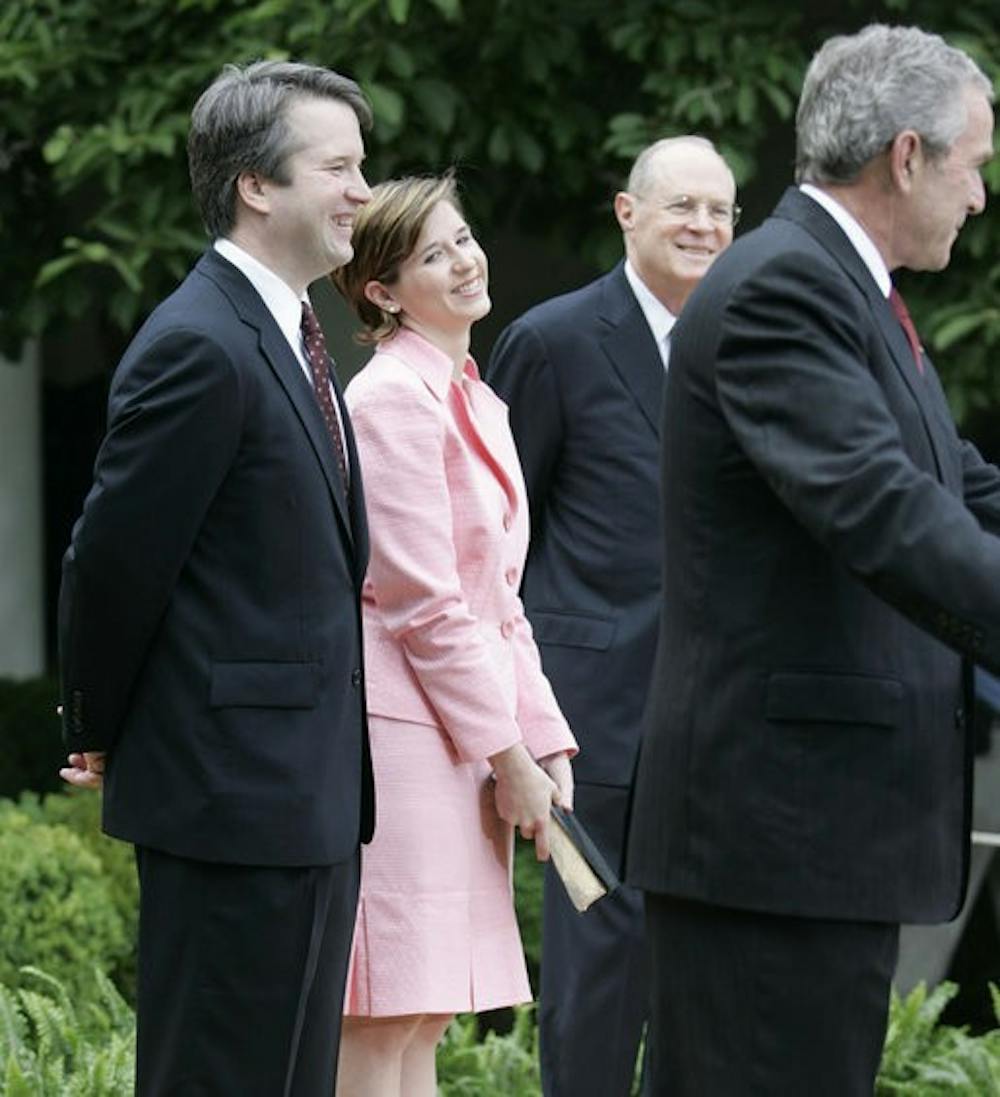Supreme Court nominee Brett Kavanaugh is trying to convince Democrats that he would not be an anti-women judge. But his opening statement to the confirmation hearings should do little to assuage anyone.
Kavanaugh spoke at length about how much he loves his mother, wife, and young daughters. He talked fondly of his daughter’s amazing hugs and the success of the girls’ basketball teams he coaches. I’m happy for Margaret that she just turned 13 and got her braces off. Kavanaugh is clearly a very proud dad and coach. But frankly, what does any of that have to do with evaluating how he would rule on issues concerning the rights of women and girls before the law? What does it tell me about whether my right to make my own reproductive decisions without undue burden or state interference will be protected with Kavanaugh on the bench?
Kavanaugh emphasized the value of the strong women and girls in his life, echoing the broader GOP discourse of celebrating individual “strong women” while failing to protect and/or proving actively hostile to the rights of women in general. Most people, politicians included, love at least a few women — whether those be their mothers, sisters, wives, girlfriends, aunts, etc. But that tells us very little, if anything, about their political positions vis a vis gender equality. The only thing in this personal vein I can think of that would genuinely help me to evaluate Kavanaugh substantively would be if he stated that because his daughters might someday need abortions, he is committed to upholding Roe v. Wade and Planned Parenthood v. Casey.
This isn’t about whether Kavanaugh is personally threatening to women. It is about whether he is politically threatening to women. I believe he is. Kavanaugh wants it both ways. He repeatedly stated in his remarks that his personal beliefs will not influence how he rules because partisanship is not what the judiciary is about. Yet at the same time, he sought to invoke his personal love for strong women and girls and his personal commitment to mentoring female clerks to reassure senators and viewers that he would not be an anti-women’s rights judge.
What has Kavanaugh said about substantive issues that disproportionately affect women? Very little, so far. He made abstract statements; his words were slippery and vague enough that they could not be pinned down as any sort of concrete commitment.
For instance, he said that his mother taught him, by her own example, that a judge does not decide on abstract principles. Each case is about the people involved, so a judge must put herself or himself in the shoes of those people. But my question is: Where was Kavanaugh’s empathy when a 17-year-old immigrant girl needed an abortion and had already been forced by the Trump administration to delay her abortion by almost a month? Kavanaugh’s decision in her case would have forced this young woman to delay her abortion even longer. (Fortunately, his decision was reversed in a subsequent hearing.)
For me, it does not take a large stretch of the imagination to put myself into the shoes of “Jane Doe” in this case. I think about what I would feel in such a situation: overwhelming panic, terror, anger, and desperation. I would be outraged to have my personal reproductive decision dragged before courts and the judging eyes of men like Kavanaugh. In such a situation, I would think of his decision as unbelievably callous and insensitive to my predicament. So I ask: Can Kavanaugh really put himself into the shoes of plaintiffs like Jane Doe?
Also, Kavanaugh knows very well that a Supreme Court case is never just about one case, or one set of people. There are always principles involved — that is why the case made it to the Supreme Court. Decisions must be made with careful consideration of history, present, and future — for instance, careful consideration of the women who have died because abortion was illegal and those who would die if the constitutional right to safe, legal abortion were lost or gutted.

Kavanaugh expressed deep reverence for the retired Justice Anthony Kennedy, summarizing Kennedy’s legacy in one word: “liberty.” But what does that mean? Will he uphold that legacy? Because at the core of Kennedy’s legacy of liberty were (some) gay rights and (some) abortion rights.
Kavanaugh stated again and again that he is “pro-law” and would interpret the law, not make it for a political purpose. If this is so, then it seems he should be committed to upholding Roe v. Wade because it is (in his own words) “settled law.” To reverse it at this point in time would be a flagrantly political act. Yet Kavanaugh’s leaked emails undermine even that tepid 'pro-law' statement, as he expressed doubt that Roe really is settled law and said that even if it is, precedent can “always” be overruled.
Kavanaugh stated that he stands for “equal rights, equal dignity, and equal justice under law.” But does Kavanaugh recognize how important reproductive choice is to that “equal dignity”? It is illustrative to contrast Kavanaugh’s undefined statement about dignity with Ruth Bader Ginsburg’s statement during her own confirmation hearing that the ability to make a decision about whether to bear a child is “something central to a woman’s life, to her dignity.”
Neither Kavanaugh’s vague statements of principles nor his statements about his love for the women in his life should give us reassurance that he would bring any commitment to substantive protections for women and girls to the bench with him.

Katherine Fleming is a senior concentrator in history from Brookline, Mass. She can be reached at kfleming@princeton.edu.








